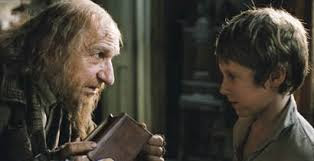Oliver Twist
Roman Polanski's Oliver Twist raised barely a blip on the cinematic radar screen when it was released in 2005. However, I think it is probably the best version of the novel and though it is a middling Polanski film, it is very much a personal film that fits firmly within his distinguished body of work. The claustrophobic interiors of Repulsion, Rosemary's Baby and The Tenant are in evidence here, as are tracking shots through a ghetto, as in the Pianist. The doom and violence that haunt Chinatown and Macbeth are present, as are the period detail and critique of the patriarchy featured in Tess. I could go on and on. Polanski is a major cinematic artist whose work, even when he is not at his best, is rife with undercurrents and themes that repeat consciously and unconsciously.
Oliver Twist's status as a children's book would make it seem an odd choice for Polanski, but it is dark and unsettling book no matter the reader's age. Certainly, Dickens' gallery of grotesques and monsters is right in Polanski's wheelhouse. I can remember being shocked at the perfidy of Bill Sykes' murder of Nancy when I saw Carol Reed's toothless Oliver! at the age of eight or so. The expressionistic version of 1948 by David Lean made an even deeper impression on youthful me. Ronald Harwood's screenplay streamlines the plot a little less than those versions. He smartly retains the scene of Oliver visiting Fagin in prison. Even though Harwood's script lacks the narrative motivations for this visit, the scene beautifully expresses Oliver's empathy. Fleeting moments of grace are welcome in an oeuvre in which a paranoid and deeply troubled (and troubling) artist confronts a monstrous world.
Subscribe to:
Post Comments (Atom)
-
Rachel McAdams Sam Raimi's Send Help is genuinely exciting cinema, his best film since Spider-Man 2 . As usual, the pulpiness of Raimi...
-
Matt Clark and David Canary I was surprised by how much I enjoyed Dan Curtis' Melvin Purvis: G-Man , a made for television movie that pr...
-
Takeshi Kitano Takeshi "Beat" Kitano's Broken Rage has languished all 2025 on Amazon Prime with little notice. It is an odd f...
-
Ben Affleck and Matt Damon Joe Carnahan's The Rip is a good meat and potatoes crime film that stars Ben Affleck and Matt Damon and is n...
-
Cillian Murphy I enjoyed the film adaptation of Claire Keegan's novel Small Things Like These more than I expected to, if enjoyment is ...






No comments:
Post a Comment